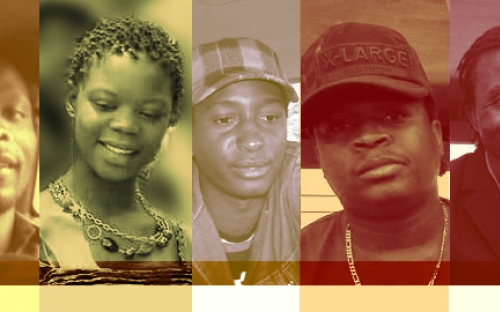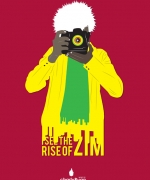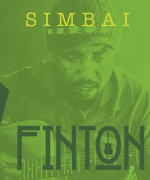Mafriq and Xtra Large in South Africa
In the quest to find out what Zimbabwean 'yute' is up to and how it is contributing to the socio-political landscape, ZimboSA caught up with two of the hottest music groups on the Zimbabwean scene, then in town[Jozi] for a gig. Mafriq and Xtra Large are two of the groups that performed at the ZimboSA concert held late last year in Jo'burg where they shared a stage with the likes of Sani Makhalima, Shingi Mau Mau and the likes of Zimbabwean-originating and South Africa based Zubs a.k.a The Last Letta. While behind the wheel treating our artists to their last dose of Jozi sun for the yesteryear, Robert Machiri spent an afternoon in conversation with Lovedale 'Discord' Makalanga, Pauline 'the Queen' Gundidza and 'Tunga T' Mavi of Mafriq. Meanwhile, cruising in the backseat of the Cedric, were Xtra-Large's Norman Manuere and Jim 'SnaggaJim' Mangezi.
RM: What is happening in Zimbabwe in terms of the Arts?
Lovedale: Zimbabwe is recovering from the situation it was in 2 years ago so with most of the things, we are still trying to adjust - in terms of using the foreign exchange buying new equipment which was not possible 2 years back due to hyperinflation. On the political front, things are really starting to look up. The political parties have reached some form of consensus and we, as musicians are trying to spread a message of hope with our music. Hopefully, going forward, we will start realizing income for our efforts, but at present the income is not guaranteed.
RM: Do you feel you are rewarded duly for your work?
Tunga: It varies because sometimes you get a good show whereby you are paid your worth as an artist but at times people take us for granted because we are young and maybe they feel that we are not as stable in the industry as they would want us to be, but we are. We regard ourselves as business people and would like promoters to take us seriously by rewarding us according to our worth.
RM: Do you have a busy calendar?
Pauline: We make our own calendar. Unfortunately, it varies with the seasons. We do not really have a consistent performance leg but from about April/May to end of year, things are quite heated, especially from August onwards. We have a lot of festivals and cultural activities happening at that time – a lot of commemorations that are happening nationally. As of late, we have been getting a lot of international shows. I think the exposure that we have had over the years through the internet and all that, is finally beginning to pay off. This year we managed to go to the UK, we have been in South Africa 2 or 3 times for shows which is different from all the other years that we have been in this industry and we hope that from now, things continue to go forward. We would like to tour the world if possible.
RM: So there is enough action presently in Zimbabwe, in terms of entertainment?
Pauline: We would have to say that it is not at its best. As we said earlier, we are still trying to recover from the economic situation we were in for the past couple of years. A lot of establishments have either downsized operations or closed shop, so right now we are hoping to establish regular venues, traditional venues that we had before so that we can invest and improve them for the sake of our own performances to be elevated. Shows are frequent yes, but people are hesitant about cover charges and all that. These are the things that we need to work out. We need to build funds so that we can finance our own shows and not really depend on the gate takings for our livelihood and all that.
RM: How much influence does music have in Zimbabwe?
Pauline: It is a voice. Unfortunately, the freedom of speech in Zimbabwe can be very limited because there are so many groups to protect. We don't want to jeopardize our own freedom but when it comes to art, musicians are looked up to as public voices. We can express ourselves in the interest of all the people through music without the same fingers being pointed at us or the same questions being asked us, as if we were attacking or defending anyone. It is just music and our media for distributing this message. All the clubs we perform at or all the gatherings we perform for are always mixed. You always have something to say to those people. You can't miss an opportunity to spread something positive. In as much as you can say it playfully how people are thugging it out or how people are hustling, it's a message of hope that we can survive in whatever times we are facing.
Norman: Yes, when we sing people listen.
Pauline: When you talk about relationships and all that, there is an AIDS pandemic that is a problem in Zimbabwe. We can draw attention to that by just being ourselves on stage and by conducting ourselves in an exemplary manner.
RM: So are there restrictions then, in terms of what you guys sing about?
Norman: We can't say there are restrictions as such. From what we have gathered as Zimbabwean musicians, we back home have morals so there are some sensitive issues that we do not talk about.
RM: Do you see artists of all art forms but especially musicians, promoting the use of indigenous languages or there being emphasis or respect or acknowledgement of our own languages?
Jim: It depends. We as artists representing Zimbabwe try by all means to portray our own image as Zimbabweans but now it depends on whether people would like to go with the flow and what is happening in any particular situation. Take for instance, if you come up with a Shona song and urbanise it somewhat, maybe it comes out as an R&B track; it is not like we are trying to portray the western image but we are bringing the western type of sound into our own country and conveying it to our people in our way.
Norman: The other thing is that when we do our songs mainly in our indigenous languages, I think we will be restricting ourselves. Say you want to put your song on Channel O, I think you would have to fuse your indigenous language with either English or French because most of the people who watch those channels understand either English or French.
Jim: Shongrish!
RM: So what is your take on artists who have excelled and really progressed as musicians, while using their own indigenous language? For instance, lots of African artists – the major ones like Salif Keita…
Pauline: Femi Kuti, Fela Kuti…It is commendable. We have to commend that they have done a great thing for Africa by exposing us like that and it shows the universalism of music; that people do not have to necessarily hear you word for word but the spirit of music is what is being communicated. We are encouraged by that sort of music and we hope that we can maintain our own traditional style and hope that our language becomes acceptable; it becomes familiar to our listeners who are none Shona or Ndebele speaking origin. Once you have crossed those barriers, it is a lifetime achievement.
RM: So do you not think that our music is moving more towards the west than it is towards Africa?
Tunga: We have our own style. Zimbabwe has its own music and we are trying to culture our music our own way. We don't have to sing like 2 Face from West Africa or Salif Keita to be recognized. We have to sing the way we sing our music; like Zimbabweans so that people from West Africa can say, "Okay, this is the sound from Zimbabwe!"
Norman: Even if you use English in your lyrics, you still maintain that Zimbabwean feel to your music.
Tunga: That uniqueness. Zimbabwe.
Pauline: And the beauty of Zimbabwe is that there is a variety of cultures already maintained in this country so it is not as if we are restricted to one style of music. No one can really tell you what is Zimbabwean or what is not because it is a much urbanized country. Then there is a cultural side to it as well and the fusion of those two is what gives it a Zimbabwean feel. There are Ndebele people in Bulawayo who are more drawn towards the Kwaito style and the House style because it goes hand-in-hand with their culture, as Ndebele people. Then Shona, Venda and other types of music have a common factor to them as well so you cannot limit what is Zimbabwean and what is not. Even in terms of hip-hop or whatever else, there are mixed races - there are coloreds and white people in Zimbabwe whom we have to satisfy. We have different people in our audience who also want to hear music that is made here, in Zimbabwe.
RM: Are there any collective initiatives in Zimbabwe where artists work together on a common cause?
Tunga: Yes, we have but it is not as widespread as we would like it to be. We normally collaborate for shows; Xtra Large-Mafriq, Xtra Large-Leonard Mapfumo, Xtra Large-Sniper, Mapfumo-Rocky, Mafriq-Ningi…
Norman: …and also, every now and then you find Xtra Large featuring on Sniper's, Mafriq on Xtra Large's album and the other way around.
RM: Do you see a future where you collaborate with other artists outside Zimbabwe?
Tunga: Definitely. The future is pointing in that direction. Things are getting there.
RM: Are you looking forward to more shows in South Africa?
Tunga: More.
Lovedale: We are definitely looking forward to 2010. I think that 2010 is going to propel us as Africans to see what Africa is made out of, not only Zimbabwe but us as Africans. We need to come out and express ourselves in different forms. For example, in Zimbabwe, we have our traditional Shona instrument called the Mbira, and in the western African countries they have the Jemba. I see 2010 as a platform for all of those artists in music and art to come out and shine from 2010 going forward; that is our destiny.




